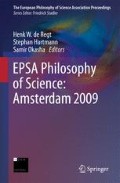Abstract
A class of broadly fictionalist and arealist objections (by Balaguer, Maddy, and others) to the indispensability argument for mathematical realism denies that indispensability entails realism. This paper argues that these objections fail against Putnam’s version of the argument: scientists indispensably use mathematics to draw conclusions about, explain, and understand the limits and reliability of the computational and modeling techniques they employ, and the very content of these conclusions and explanations appears to be unintelligible without a realistic understanding of the mathematics they presuppose.
[A]n engineer should use mathematics as a tin-opener is used to open tins of meat. The mathematician also uses mathematics as a tin-opener, but to open tins of tin-openers. Sometimes he is content to indicate the bare existence of a symbolic tin-opener without reference to a tin of anything. He is quite right to do this in the pursuit of pure knowledge; and it is our fault if we do not fully appreciate that his objects frequently differ from ours.
(M. Hotine 1946, quoted in Maling 1992, 100)
Access this chapter
Tax calculation will be finalised at checkout
Purchases are for personal use only
Notes
- 1.
I choose Maddy as target partly because of space considerations but partly also because she directly tackles difficult questions about applications of mathematics in science about which other versions are less forthcoming. I believe my response to her version generalizes to others’ though I lack space to argue this here. See, e.g. (Liston 2003–2004) for a critique of (Balaguer 1998).
- 2.
Compare this with Balaguer’s claim that, though “The temperature of physical system S = 40°C” appears to express a mixed fact relating S’s purely physical state to a number, all the scientist needs to be committed to is its nominalistic content; science is successful insofar as the physical world “holds up its end of the empirical science bargain” (1998).
- 3.
Balaguer bases independence on causal considerations. Maddy’s argument for independence is bound up with her project of Second Philosophy. But her thinking seems to be this: since mathematics isn’t confirmed by the normal empirical methods of science and common sense, we have no grounds to regard its objects as real or its claims as truth-apt, whereas we have empirical grounds for thinking that projectiles subject to Earth’s gravity fall unless hurled with escape velocity.
- 4.
Here I am content to argue only that mathematical truth is presupposed in our best scientific practices and leave open the question of ontological commitment.
- 5.
Thanks to Pen Maddy for pushing me on some of these issues and to Mark Wilson for drawing my attention to the many patterns in nature that applied mathematics exploits.
References
Balaguer, M. 1998. Platonism and anti-Platonism in mathematics. Oxford: Oxford University Press.
Field, H. 1980. Science without numbers. Princeton, NJ: Princeton University Press.
Field, H. 1989. Realism, mathematics, and modality. New York: Basil Blackwell.
Leng, M. 2010. Mathematics and reality. Oxford: Oxford University Press.
Liston, M. 1993a. Reliability in mathematical physics. Philosophy of Science 60: 1–21.
Liston, M. 1993b. Taking mathematical fictions seriously. Synthese 95: 433–458.
Liston, M. 2003–2004. Thin- and full-blooded Platonism. Review of Modern Logic 9.3–9.4: 129–161.
Maddy, P. 2007. Second philosophy: A naturalistic method. Oxford: Oxford University Press.
Maddy, P. 2011. Defending the axioms. Oxford: Oxford University Press.
Maling, D.H. 1992. Coordinate systems and map projections. Oxford: Pergamon Press.
Melia, J. 2000. Weaseling away the indispensability argument. Mind 109: 455–479.
Putnam, H. 1975. Philosophy of logic. In Mathematics, matter and method, Philosophical Papers, Vol.1, ed. H. Putnam, 323–357, Cambridge: Cambridge University Press.
Yablo, S. 1998. Does ontology rest on a mistake? Proceedings of the Aristotelian Society Suppl. 72: 229–261.
Author information
Authors and Affiliations
Corresponding author
Editor information
Editors and Affiliations
Rights and permissions
Copyright information
© 2012 Springer Science+Business Media B.V.
About this paper
Cite this paper
Liston, M. (2012). On Tins and Tin-Openers. In: de Regt, H., Hartmann, S., Okasha, S. (eds) EPSA Philosophy of Science: Amsterdam 2009. The European Philosophy of Science Association Proceedings, vol 1. Springer, Dordrecht. https://doi.org/10.1007/978-94-007-2404-4_14
Download citation
DOI: https://doi.org/10.1007/978-94-007-2404-4_14
Published:
Publisher Name: Springer, Dordrecht
Print ISBN: 978-94-007-2403-7
Online ISBN: 978-94-007-2404-4
eBook Packages: Humanities, Social Sciences and LawPhilosophy and Religion (R0)

